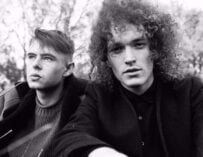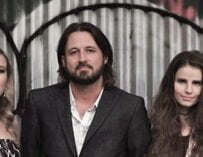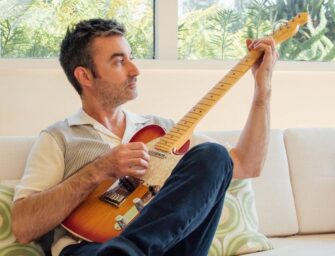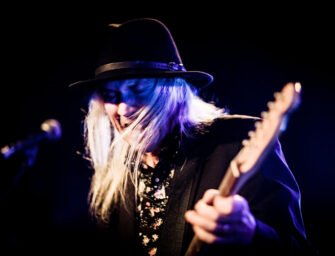
Seafret. Jack Sedman (left): “As soon as we started experimenting we got addicted to finding new sounds”
With the release of their debut album just around the corner, we caught up with the supremely talented songwriting duo
Singer Jack Sedman and guitarist Harry Draper were first introduced at an open mic night in a pub just outside of their home town of Bridlington. One hastily performed version of Seasick Steve’s Walkin Man later, a partnership was formed. The duo have been working on their sound ever since, adding electronic elements to their pared-back acoustics. Their atmospheric debut album Tell Me It’s Real has all the ingredients needed to be a huge success, with tracks Oceans, Wildfire and Atlantis already garnering an online audience of millions.
Ahead of the record’s release, we caught up with the duo in their London flat to talk about its creation…
How are you feeling about the album release?
Jack: “Happy, scared, excited.”
Harry: “It’s quite nerve-wracking. It’s our baby that we’ve been nurturing for a couple of years and now it’s actually coming out.”
J: “Is it ready, are we ready for this? Yeah we are.”
J: “One of the first songs that we wrote together is on the album and it’s been a journey since then. We picked the best songs we’ve written so far and have made them work together.”
Have the songs evolved over that two-year period?
H: “They have definitely changed.”
J: “The songs are the same, as in the chords, because we wrote them acoustically with just a guitar and the vocal, but at the start we didn’t want much production. From there to where we are now is a big change. We feel like we’ve really developed in a good way.”
What do you think has been the biggest change?
J: “Recording-wise, I think the production on the album is the biggest change.”
H: “We were very stripped-back at first and initially wanted to keep it as just guitar and vocal.”
J: “As soon as we started experimenting we got addicted to finding new sounds. The newer songs are probably a lot more produced than the older songs.”

Seafret. Jack (left): “You’ve got to be open if you’re making music together, if not then it’s just yours”
Were they all recorded in the same place?
J: “They were all recorded in London but in different studios, like The Church Studios in Crouch End, in Barnes and also the Miloco Studios You get different sounds from them all. The drums in Miloco were amazing.”
H: “It’s an old swimming pool so the natural reverb is incredible. We recorded songs like Breathe, Be There and Skimming Stones there.”
J: “All the ones with the big drums!
“Once we got over the barrier of thinking everything should be stripped back it was great. We already know the songs work acoustically, because we write them like that, so if we ever have to busk them, or turn up at a radio station to do a song off the album, we can just turn up with a guitar and play.”
H: “And for the album release we’re doing lots of acoustic in-stores in record shops.”
How do you begin creating a song together?
J: “We always start with some kind of riff or bit of music. Harry’s always playing the guitar and I just go ‘hey what’s that, that sounds like a song?’”
H: “We then try to get some sort of structure in musically, some sort of melody. Jack then goes away and writes the lyrics. It’s like a jigsaw puzzle that we’re trying to make into something that works.”
J: “We naturally work well together, and have from the start. After that first open mic night I went back to Harry’s house and he had pieces of music that he’d written without any lyrics and I just thought ‘I think I can write to that’. So then I did and in a week we had seven songs and it felt like the greatest thing I’d ever done.”
H: “That buzz was just amazing.”
J: “We still have that buzz, I think we’ve got it for life.”
Do you try to fit existing lyrics to the music or do they come from what you hear?
J: “It varies. I write all the time and often I write to what I hear in the song and how it makes me feel.”
Would you ever veto a lyric, Harry?
H: “Yeah, and I do chip in with lyrics. It’s not as separate as it sounds, we work together.”
J: “It’s a team thing. I might go away and write some lyrics and then try it out but then Harry will make suggestions about how we could change things.”
H: “And the same with the music as well.”
J: “You’ve got to be open if you’re making music together, if not then it’s just yours.”

Seafret. Harry (right): “We were lucky in that we were on the same wavelength from the start and we’ve never clashed”
Has moving to London and living together changed the dynamic, or your sound?
H: “We moved down to London two years ago into a little flat, and we’re still here. The move inspired us.”
J: “It exposed us to a lot of stuff. Back home there is just one pub that has bands on from time to time.”
H: “When we lived there we took it for granted that we were living by the sea. Being in London has made us realise that Bridlington is a beautiful place, to be surrounded by ocean is inspiring.”
There’s a palpable sense of coastal yearning on the record.
J: “That was one of the main inspirations, being pulled away from everything that you’re used to and being put into a city.”
H: “We really weren’t used to it. I’d been to Leeds a couple of times but was just a country boy who was suddenly dumped in the middle of London.”
J: “I was no country boy but when I met Harry he literally only had one pair of clothes.”
Do you ever go back home with the intention of writing?
J: “We’re writing all the time, writing our own parts separately. Harry will always be playing his guitar and I’ll be working on lyrics. But usually we go home to have a break.”
H: “Saying that, when I was home over Christmas I did do quite a lot of writing. It’s inspiring being back, just going for a walk down the beach and not seeing anyone for an hour. You don’t get that in London.”
When you first started collaborating did you discover that you also had similar influences?
H: “We really didn’t have similar interests. My dad has always been into bluegrass and country bands. I grew up with Doc Watson, Joe Louis Walker, Howlin’ Wolf and people like that, whereas Jack’s dad has always been in punk bands.”
J: “Yeah so I grew up with people like Tom Waits. It has actually helped our songwriting because we haven’t ever sat together and said ‘what do you want to sound like as a band?’ It didn’t start like that, it just started as us two jamming together and writing stuff that we felt and brought out some kind of emotion in us.”
H: “We were lucky in that we were on the same wavelength from the start and we’ve never clashed.”
It sounds like a true partnership?
H: “Definitely.”
J: “When I hear a piece of Harry’s music or guitar work I can hear a mood, whether it’s sad or happy, and in certain places I can read his mind a little bit. That helps me because I’ve then got a starting point and I know where to go next. Melodies can lead into a chord that wasn’t there before and then from that Harry creates another crazy piece and I’ll continue to add to that. We’re definitely a songwriting team. I think having somebody else takes a lot of the pressure off.
“If it was just me with a guitar or Harry writing the melody and the lyrics and everything it’s quite a big job. It’s interesting because the results that you get are something that you would never get on your own, it’s a musical partnership.”
H: “And it means it never dries up, there’s always ideas floating around because we’re both always writing. If one of us is feeling a little bit uninspired we can feed off the other one.”

Seafret. Jack (left): “We’re definitely a songwriting team. I think having somebody else takes a lot of the pressure off”
Do you enjoy talking about the meanings behind your songs or would you rather let them speak for themselves?
J: “Everyone has a unique experience when they’re listening to music. You’ll listen to a song and it will make you cry it because it reminds you of a moment in life that was sad but someone else will do the opposite for their own reasons and I like that.”
H: “The best kind of songs mean a lot to loads of different people yet there’s not one set reason for it.”
J: “Lyrics that have multiple meanings, so you can interpret them and listen over and over again and still be finding out what the song is about. There’s a bit more in it than just ‘I love you, you’re a girl and I’m a boy.’”
Is 2016 already laid out for you?
J: “I can’t even think about anything else until the album is out.”
H: “We’ve got a lot of touring to do too, but we’re not thinking about that at the minute. Up next are the in-stores which will be a lot of fun as we’ll get to meet the fans.”
J: “It’s such a strange thing, releasing an album for the first time. Especially when you’ve waited such a long time. We could have already banged out a couple but we’ve really tried to take time and bring it up to a standard where we’re happy with it. We’re developing as we go and we’re trying to beat each last song every time we write. We’ve got to pace ourselves a bit.”
What are your biggest hopes for the album?
H: “To connect with as many people as possible and to be able to tour it and for people to actually turn up.”
J: “And for people to like it. It’s exciting times!”
Interview: Duncan Haskell
Tell Me It’s Real will be released on 29 January 2016 on Sweet Jane/Columbia Records. For more information please check out the band’s website: seafret.com

































Related Articles